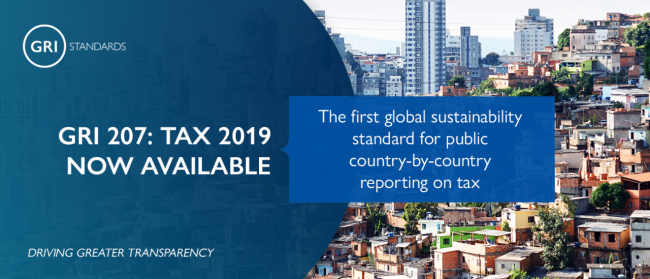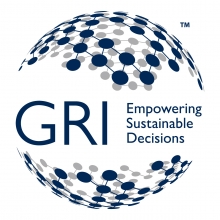First Global Standard for Tax Transparency
No hiding place: companies need to demonstrate they pay their fair share
Published 12-10-19
Submitted by Global Reporting Initiative

The launch of a new tax reporting standard that seeks to ensure multinationals are much clearer about how much – and where – they pay their taxes has received widespread international support.
The GRI Tax Standard is the first global standard for comprehensive tax disclosure at the country-by-country level. It supports public reporting of a company’s business activities and payments within tax jurisdictions, as well as their approach to tax strategy and governance.
Global investors, civil society groups, labor organizations and other stakeholders have all signaled their backing for the Tax Standard, as it will help address their growing demands for tax transparency.
The Tax Standard has been developed in response to concerns over the impact tax avoidance has on the ability of governments to fund services and support sustainable development – and to give clarity on how much companies contribute to the tax income of the countries where they operate.
As the latest addition to the GRI Standards – the world’s most widely adopted sustainability reporting framework – it is now freely available to organizations around the world.
Tim Mohin, GRI Chief Executive said:
“Payment of taxes is a major way for companies to support the communities where they operate. Yet too many businesses are unwilling to disclose how much, and where, they pay taxes. GRI’s Tax Standard challenges this status quo by outlining clear best practice for disclosure.
I believe more companies will join other responsible leaders and demonstrate how they’re meeting their obligations to society. These businesses will reap the benefits of their leadership by improving relationships with governments, investors, civil society, consumers and other stakeholders.”
Fiona Reynolds is CEO of PRI (Principles for Responsible Investment), the global investor network of over 2,600 signatories who collectively manage in excess of US$89 trillion. She said:
“Tax avoidance is a leading driver of inequality and as such a responsible approach to tax by business is essential. The PRI has been leading efforts to drive more meaningful corporate disclosure. GRI’s new Tax Standard marks an evolution in tax transparency and provides a much-needed and ambitious framework for corporate tax reporting.”
Olivier Boutellis-Taft, Chief Executive of Accountancy Europe, said:
“GRI’s new tax disclosure standard is a vital contribution to address stakeholders’ demand for corporate tax transparency. Accountancy Europe stands for transparency and trust: we therefore commend GRI for pioneering reporting in this sensitive area with great balance and for providing a global, meaningful and practical format for companies that choose to explain how they handle their tax affairs. We look forward to continue working with GRI on tax and other crucial sustainability matters.”
Daniel Bertossa, Assistant General Secretary of Public Services International, the global trade union federation, said:
“Tax avoidance comes with high human costs as it undermines governments’ ability to provide quality public services and promote economic development. We cannot tackle pressing global issues like poverty reduction, climate change and implementation of Sustainable Development Goals without a fair and adequate tax system.
There is growing anger around the world at governments’ inability to deal with the issues people care about, which is eroding trust in public institutions. The GRI Tax Standard is absolutely necessary to hold multinational corporations to account and ensure governments can develop the fair tax policies needed to fund services and restore public confidence.”
Alex Cobham, Chief Executive of the Tax Justice Network, said:
“Every year, the global economy we all live and work in loses an estimated US$500 billion to multinational corporations not paying the tax they owe – that’s $500 billion less each year to fund public services and invest in our communities. This injustice and the global inequality it fuels has in part been made possible by the lack of reliable and comparable, country-by-country information on the taxes that multinational corporations contribute. That is why we need to reprogram our approach to tax, starting with the crucial transparency that adoption of GRI’s new Tax Standard can help achieve.”
Gary Kalman, Executive Director of the FACT (Financial Accountability and Corporate Transparency) Coalition, said:
“GRI’s Tax Standard is the clearest and most significant recognition to date of the global trend toward tax transparency for multinational companies. The standard is both necessary and balanced. We urge companies to quickly implement this standard and help make it the model for the transparency that will soon become common global practice.
“The multi-stakeholder process that produced this standard ensures that the information is helpful to investors while workable for companies. As a result, GRI has done something that is somewhat rare: they have produced a standard that is both relatively straight forward and enormously impactful.”
Notes to editors
Further endorsing quotes in support of the Tax Standard are available, including the following companies, organizations and individuals: Aberdeen Standard Investments; Hermes Investment Management; MFS Investment Management; Oxfam; Paul Tang MEP; Tax Research UK; Royal London Asset Management; VBDO (Dutch Association of Investors for Sustainable Development).
View the new GRI Tax Standard (to be known as GRI 207: Tax 2019). A fact sheet is also available.
The Tax Standard was drafted by a multi-stakeholder Technical Committee appointed by the Global Sustainability Standards Board, GRI's independent standard-setting body. It’s development was informed by global consultation, including a public comment period, when strong support was received from investors.
The Tax Standard builds on the aims of the OECD Framework on Base Erosion and Profit Shifting (BEPS), which requires large multinationals (in OECD countries) to provide country-by-country data to tax administrations. The GRI Tax Standard focuses on public reporting – making tax information available to all stakeholders – and applies globally.
Estimates of the scale of tax avoidance, in terms of lost revenue to governments, have ranged between US$500-600 billion annually (according to UNU-WIDER and the International Monetary Fund).
The Global Reporting Initiative (GRI) is the independent international organization that helps businesses and other organizations understand and communicate their sustainability impacts.
- For enquiries, contact GRI

Global Reporting Initiative
Global Reporting Initiative
The Global Reporting Initiative's (GRI) vision is that reporting on economic, environmental, and social performance by all organizations becomes as routine and comparable as financial reporting. GRI accomplishes this vision by developing, continually improving, and building capacity around the use of its Sustainability Reporting Framework.
An international network of thousands from business, civil society, labor, and professional institutions create the content of the Reporting Framework in a consensus-seeking process.
More from Global Reporting Initiative

